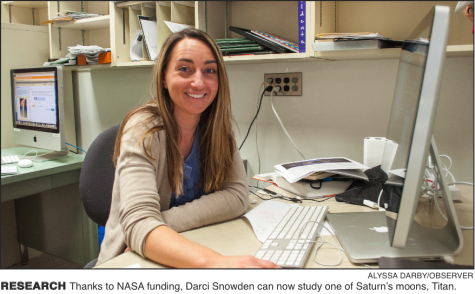NASA awards $184k to CWU professor
November 13, 2014
Dr. Darci Snowden received a grant from National Aeronautics and Space Administration (NASA) to do scientific research on the Cassini Solstice Mission. She is currently working on interpreting data for the mission.
The grant totaled about $184,000 and was awarded to Snowden to research the atmosphere around Saturn’s moon, Titan.
Snowden, a physics professor, is fairly new to teaching–this being only her second year–with the exception of holding a brief TA position at the beginning of graduate school. Besides this, Snowden has been a research associate at the University of Arizona.
“This has definitely been a learning experience for me,” Snowden said.
Originally from Missoula, Mont., Snowden also briefly lived in Florida when she was young.
Snowden has always had a love for the outdoors and the Northwest area, and when asked what started her interest in science, she said it was probably having lived in these areas.
Since Snowden was young, there had never been any doubts that she wanted to go into science.
Snowden’s love for this area is one of the main reasons why she chose to teach at Central.
“I was interested in being in a place like this, that has a lot of opportunities to teach and work with students directly,” Snowden said. “But I’m also a huge fan of the Northwest, so when I was thinking about where I wanted to land in life, I definitely wanted to be here.”
Snowden pursued a bachelor’s degree in physics at Harvey Mudd College in California, and her graduate certificate in astrobiology and Ph.D. in geophysics at the University of Washington for.
Andrew Piacsek, physics department chair, says he has known Snowden since 2013, and has had a great experience working with her.
“She just had a really good work ethic, and a good presence in the classroom. She knew how to get a good grant from NASA, and it would have been crazy not to hire her,” Piacsek said.
The grant is to write models, do data analysis and study the atmosphere using Cassini data, according to Snowden.
“I’m trying to understand the input of energy from particles in Saturn’s magnetic field that are accelerated or brought to very high speeds by the magnetic field–how they come into Titan’s atmosphere,” Snowden said.
All of Snowden’s research will be done in Ellensburg. The project is done entirely on computers, and therefore can be done anywhere she goes.
“There are struggles at every stage… Getting my undergraduate degree was not a piece of cake, and graduate school had its own struggles,” Snowden said. “A lot of that was self-motivation to have that inner drive to finish the research.”
The mission has made over one hundred ‘fly-bys’ around Titan and has been active for about ten years, but will end in 2017 by crashing the satellite into Saturn.
Before the mission, barely anything was known about Titan, but it is now known that Titan’s geology is incredibly similar to Earth’s. Research has also found that its atmosphere also produces a large amount of organic material.
Snowden says that the Cassini mission is the last planned large-scale NASA mission. In future years there will only be small missions and projects.
“I don’t know if there will be another [mission] as big as Cassini in my lifetime,” Snowden said. “So it’s really great to be a part of it.”



